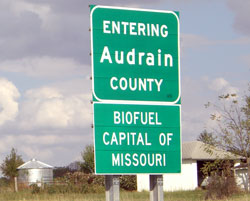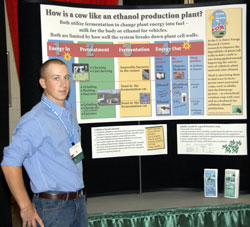A bi-partisan piece of legislation has been introduced that will dedicate some of the nation’s diesel supply to biodiesel. The Biodiesel Promotion and Quality Assurance Act of 2007, sponsored by U.S. Representatives Baron Hill (D-IN), John Shimkus (R-IL), Nydia Velazquez (D-NY), Kenny Hulshof (R-MO), Stephanie Herseth-Sandlin (D-SD) and Sam Graves (R-MO), puts aside some of the 60 billion gallons of diesel produced in the U.S. each year for biodiesel and other biobased replacement diesel fuels.
This press release from the National Biodiesel Board says it recognizes biodiesel’s contribution as a blend component to diesel fuel as well as creating a minimum usage requirement for biodiesel and “biobased replacement diesel” that increases from 450 million gallon in 2008 to 1.25 billion gallons in 2012:
“It is critical that we move America away from foreign fuels and become energy independent,” said Representative Hill. “Biodiesel and other biobased diesel replacements offer a domestic fuel source that can be used right now to displace foreign oil. It is important for our country to move forward in an economically and environmentally responsible way, and this legislation does just that.”
The legislation has gained the praise of the NBB:
 “This legislation is good for America’s energy security, economic growth and the environment because it would set a floor for biodiesel demand,” said Joe Jobe, NBB CEO. “The young U.S. biodiesel industry can do more to expand America’s domestic refining capacity if this legislation is enacted. The biodiesel industry looks forward to working with Congress to pass a renewable requirement in the nation’s diesel pool as part of any effort to expand the Renewable Fuels Standard.”
“This legislation is good for America’s energy security, economic growth and the environment because it would set a floor for biodiesel demand,” said Joe Jobe, NBB CEO. “The young U.S. biodiesel industry can do more to expand America’s domestic refining capacity if this legislation is enacted. The biodiesel industry looks forward to working with Congress to pass a renewable requirement in the nation’s diesel pool as part of any effort to expand the Renewable Fuels Standard.”


 While I was on my way to do some field work this weekend I passed this sign driving into Audrain County, MO.
While I was on my way to do some field work this weekend I passed this sign driving into Audrain County, MO.
 Ethanol production continued to grow in July, averaging 421,000 barrels per day, according to the Energy Information Administration. Ethanol demand, as calculated by the
Ethanol production continued to grow in July, averaging 421,000 barrels per day, according to the Energy Information Administration. Ethanol demand, as calculated by the  As you might remember from
As you might remember from  Shipping giant UPS has announced that 366 of its ground support vehicles at its worldwide air hub in Louisville, Kentucky will be running on biodiesel.
Shipping giant UPS has announced that 366 of its ground support vehicles at its worldwide air hub in Louisville, Kentucky will be running on biodiesel. A proposed ethanol plant in Mayfield, Pennsylvania is planning to be a green new breed.
A proposed ethanol plant in Mayfield, Pennsylvania is planning to be a green new breed.  The new generation plant is being designed by
The new generation plant is being designed by  The conference, which has been held previously in Bonn and Beijing, is an opportunity for government, private sector, and non-governmental leaders to jointly address the goal of advancing renewable energy.
The conference, which has been held previously in Bonn and Beijing, is an opportunity for government, private sector, and non-governmental leaders to jointly address the goal of advancing renewable energy.  Oregon Gov. Ted Kulongoski cut the ribbon on the Pacific Northwest’s first commercial ethanol plant Friday in Boardman.
Oregon Gov. Ted Kulongoski cut the ribbon on the Pacific Northwest’s first commercial ethanol plant Friday in Boardman. Here is a riddle for you – “How is a cow like an ethanol production plant?”
Here is a riddle for you – “How is a cow like an ethanol production plant?”